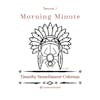

Guests: The LGBTQ+ Older adults of SAGE USA
(Disclaimer: Participants have changed their names for safety reasons)
Over the summer of 2023, Coleman Global partnered with Sage USA to bring "The Colors of Sound" podcasting workshop to LGBT+ older adults in New York City. The intergenerational sessions focused on ‘Finding Your Point of View’ (POV) and the art of storytelling.

Title: "Transgendered"
Guests: The LGBTQ+ Older adults of SAGE USA
(Disclaimer: Participants have changed their names for safety reasons)
Over the summer of 2023, Coleman Global partnered with Sage USA to bring "The Colors of Sound" podcasting workshop to LGBT+ older adults in New York City. The intergenerational sessions focused on ‘Finding Your Point of View’ (POV) and the art of storytelling.
@ColemanGlobal, @SAGEUSA, @sageusa-lgbtq, @jpmorgan
#TakeBackMonday, #Purpose, #Service, #Community, #People, #InnerCircle, #QuoteOfTheDay, #community-service, #bronx, #smallbusiness, #newyork, #black, #positivevibes, #learning, #workshop, #intergenerational, #podcasting, #LiveBrave, #intergenerationalprogramming, #technology, #LifeLearner, #ColemanGlobal, #LGBTQ+
--- Send in a voice message: https://podcasters.spotify.com/pod/show/colemanglobal/message Support this podcast: https://podcasters.spotify.com/pod/show/colemanglobal/support
In a world where so many things are vying for your time, I just wanted to say, Thank You for your attention.
In Unity,
Timothy
The Colors of Sound.
Intergenerational Programming
Topic: Transgendered
Recorded: August 2, 2023
(disclaimer: Participants have changed their names for safety reasons)
WDON1204.com is proud to present our latest podcast, The Colors of Sound. Our mission is to create a safe space for community members from around the world to share their personal stories. Listen on all streaming platforms or on our podcast station wdon1204.com.
The Colors of Sound podcast. Discover how much we have in common.
Over the summer of 2023, Coleman Global partnered with Sage USA to bring The Colors of Sound podcasting workshop to LGBT+ older adults in New York City. The intergenerational sessions focused on ‘Finding Your Point of View’ (POV) and the art of storytelling.
Each week, participants crafted their own topics for discussion, developed their own questions to help move the conversations along, spoke about podcasting equipment, and had brief discussions on how to market podcasts online. Throughout the workshop series, the participants shared their personal stories of both struggle and of triumph. We laughed about the things that are common in society and debated those things that divide our global community.
Welcome to “The Colors of Sound Podcast”. You are now a part of the conversation.
Welcome
Hi, I'm Sylvia from the Bronx. Our topic today is about transgender women.
Definitions
The National Center for Transgender Equity's website gives the following information. Transgender is defined as a person whose gender identity does not correspond with the sex registered for them at birth. It goes on to say, gender identity is your internal knowledge of your gender.
For example, your knowledge that you're a man, a woman, or another gender. Gender expression is how a person presents their gender on the outside. It might include behavior, clothing, hairstyle, voice, or body characteristics. To treat a transgendered person with respect, you treat them according to their gender identity, not their sex that was assigned at birth.
The Conversation
If we could go around the table now, uh, and just introduce ourselves really quickly for the audience. La La from Queens. Candy from the Bronx. Star from Brooklyn. Marie from the world. And it's Polka from the Bronx.
So today our conversation is about transgendered women.
What does it take to be a woman? Do you see a transgendered person as their, uh, for lack of a better phrase, new identity?
Yeah, I can see that. I can see their new identity. I mean, their appearance, they look just like a woman. So, I can see that part. I think they exaggerate.
They exaggerate.
Alright, come a little closer to the microphone. Tell me, tell me, why do you say that?
Because of their actions and how they movement.
Some of them do over exaggerate because we as women, as cisgender, we don't act like that. We really don't. I mean, and they're very flamboyant, but I don't take that away from them. That's just who they are. That's who they choose to be.
You know, I don't, I, I, okay. I put them on a scale. They are women because this is, in their mindset, this is who they always were meant to be. Just like trans men were always meant, they always knew that they were in a body that they weren't comfortable in, and they always knew that they were someone else.
I don't take anything away from them at all. I mean, they're transgender, they're who they want to be. And that's just them. But their flamboyance, that's what really gets me. But other than that, I have no problem with it.
So, what do you feel about, because I, in, in listening to you, right, and in listening to that definition, um, or that description, I feel like there are also certain gay men who are more flamboyant than, than cisgendered women as well.
So, right, so I, so I, what is the perception of a woman? Right? Like, let's kind of start with that. What is the perception? What is a woman? What is being a cisgendered woman?
I don't think, biologically, the anatomy of a woman is secure. Yes, I understand that. Um, but being a woman in my eyes, and especially dealing with the trans community within ballroom community as well, there's a lot of different standards for trans women.
Trans women do give their homages to the cisgender community only due to the fact that we as let me speak as a gay man. We don't know how to portray a woman. So now I try to attend most of the transgender communities that I know that I've interacted with. They will tell you, yes, I'm all the woman I am today after my mother.
Like every transgender woman has some kind of idea of a woman they want to be. And I don't feel like the anatomy decides if you're a woman. I feel like it's all about the essence. It's about what you do as a woman. And I, you know, we can say. Genetically, you're a female, but the ambiance, the essence that you get when you go in a room is a ladylike.
That's what I look at to determine if you're, you know, that feminine woman. Like there is butch transgender women, too. That could be a little off putting when you first see them, because it's just like, you don't know what they're more leaning for. But at the same time, you gotta look at what they're doing with the person that they are.
If they're giving that woman idea, or you know, ideology of that woman. If it's transferable, you know, to everybody, their own ideas. I really can't say, I don't want to take away from them, because at the end of the day, everybody got to struggle. Every gender has to struggle. And it shouldn't be dealt with if it's about their sexuality, or what they're doing, or who they're becoming.
Definition
Transgendered woman is defined as assigned a male at birth, but whose gender identity is that of a woman. A transgendered man was assigned as a woman at birth, but whose gender identity is that of a man.
Conversation…
Well, I think that, um, this is Marie, and this is my opinion. I think that we have to rewrite the dictionary. Because the dictionary and the way that we grew up, certain generations, we have certain ideas of what a woman is. We talk about the physical. Okay, the woman, the female. And now things are changing. Okay, if I say today I want to be a man, do I really know what it's like to be a man? You know, I wasn't born a man.
I don't have the equipment that a man has. Okay, some people who are physiologically developed have some male organs or, or, or so they may possibly know what it feels like to be a man, but someone who, um, just decides, okay, I'm, I'm a man, what is a man?
So do you feel like their, that the outward statement of identity comes from what you feel is natural to you on the inside?
Right. When you ask a kid what they want to be when they grow up, they might say a fireman. You don't know what it feels like to be a fireman. That's something that is learned and developed over a period of time and a period of experiences. So at what point do we allow people to just be whatever they feel on the inside?
I think that we have to allow people to do that. See, that's, that's the catch to all of this. Be who you want to be. I used to, um, work a lot with the trans community. Um, when I worked for the Bronx, um, LGBT Center, from, you know, young kids up until, you know, fathers of, um, of, of communities, you know, the mothers of houses.
I worked with them when they were, you know, before they blossomed, okay? So I've seen the transition. And I've seen it, and I've always respected them.
Does anybody else know or have a friend who is trans?
Yeah, a lot.
So, so do you have conversations with them about their journey or their experience? Like, what are some of the things that you hear that they share?
Um, well, okay, I have, um, a friend that's, um, a transgender male. And I asked him, because I was curious. I, I never... I mean... I've never met a transgender male. So I asked him from the beginning. Um, I asked him about everything. Um, and he said that he's always felt since he was little that he wasn't in the body that he was supposed to be in.
He has a very supportive family. His mom, everybody supports him, and he said his mom knew when he was young that he wasn't a girl. Um, and she accepted that. And, but the thing that I find interesting is that they still to this day, now he's fifties in his fifties and they still have to go to, they still see their um, psychiatrist. They have to, they have meetings that they have to go to, I don't know how often it is, once a month, but I guess this is, what they have to do for the rest of their lives. They go see this person and they talk to this person, I guess, about their feelings and what not. But, um, I find them very interesting. I really do.
Just to know that you were born a certain way and you, you don't feel the way your body looks. And it's just like, it's just like, um, jazz. Transgender Jazz that's on TV. She, you know, she always talks about how from a very young age and her parents allowed her to be who she wanted to be. Like they let her hair grow long and she wore women's, you know, little girls clothes and stuff like that and they were very supportive.
And I think that's awesome. I was brought up to see people as who they are, you know, not what they was, not what you're supposed to be, but who they are. I see that's how I was brought up, so I don't judge anybody.
We're taught that to, to see people how we want to see them, right? I think when you look at a group of children, I've seen studies on this. When you look at a group of kids, uh, as they play together. It doesn't matter what color, it doesn't matter what gender, it doesn't matter what you're wearing, it doesn't matter how loud your voice is or how quiet you are, kids just play. And they figure out how to make fun out of every situation. Why are we not capable of doing that as adults?
SAGE USA Mission
Sage leads in addressing issues related to lesbian, gay, bisexual, transgender, queer, and questioning and other self-identifying members of the community aging in partnership with its constituents and allies. Sage works to achieve a high quality of life for LGBTQ plus older people. Supports and advocates for their rights, fosters a greater understanding of aging in all communities and promotes positive images of LGBTQ plus life in later years.
The Conversation Continues
It's, it's a January in the year of an election. You've got the whole world on the podium before they swear in the new president. And you want to make sure the incoming president respects not only who you are and how you identify, but also respects, uh, the trans community. What is something, a short sentence or statement that you would say to the world right now in support of people being seen for who they are?
Be who you were meant to be. And don't let anyone take away your self worth. That's, be, be you.
I think that I would say, um, allow people to identify the way they want to be. Okay. Or, you know, and no judgment. That's it, no judgment. Yeah. If I say this is who I am, that's who I am. And as long as I'm not…you know no one is harming anyone else.
There you go. I just ask. They understand the trans community. Mm-hmm. . Yeah.
If the person threw it back on you and said, tell me one thing you understand, uh, about the trans community, that would give me a deeper understanding, what would you say? What's one thing that you understand about?
But I would, I would say that from what I've told, what I was told, I'm, I'm not sure, but they were already, they was already built that way. They was born that way. Mm-hmm. , you know, From the inside. From the inside.
Okay. How about you?
Um, I would just basically have them understand that the trans community has became one of a new minority group within America. And so, we have our black rights, but then we have our trans rights. And no matter what, like, they kind of play into each other. So therefore, the same amount of respect that you give every societal norm in America. That needs to be one of your main focuses of creating a norm for it.
That's really good. Excellent. Excellent.
Thank you to the participants of Sage USA for joining me on the Colors of Sound podcast. We've had a rich discussion about the transgendered community and our takeaway from today is this…
We have to learn to accept people for who they are, not who we want to force them to be. Every single person has a struggle, whether we share it out loud or not, so be careful with one another because we don't know how another person may feel on the inside. Love comes from the inside out, and if we truly love ourselves, we will be better prepared to love others as well.
I'm Timothy StoneDancer Coleman, and this is The Colors of Sound podcast.
Share your story on the Colors of Sound podcast. Our mission is to create a safe space for community members from around the world to share their unique stories. Do you have an interesting story to share? Or perhaps a journey of triumph from a challenge that you faced? Do you want the world to know about your talent?
Visit our website and complete our guest intake form at WDON1204.com
The Colors of Sound Podcast. Discover how much we have in common.
Featured Episodes
Check out the latest podcast episodes from our channel.





















